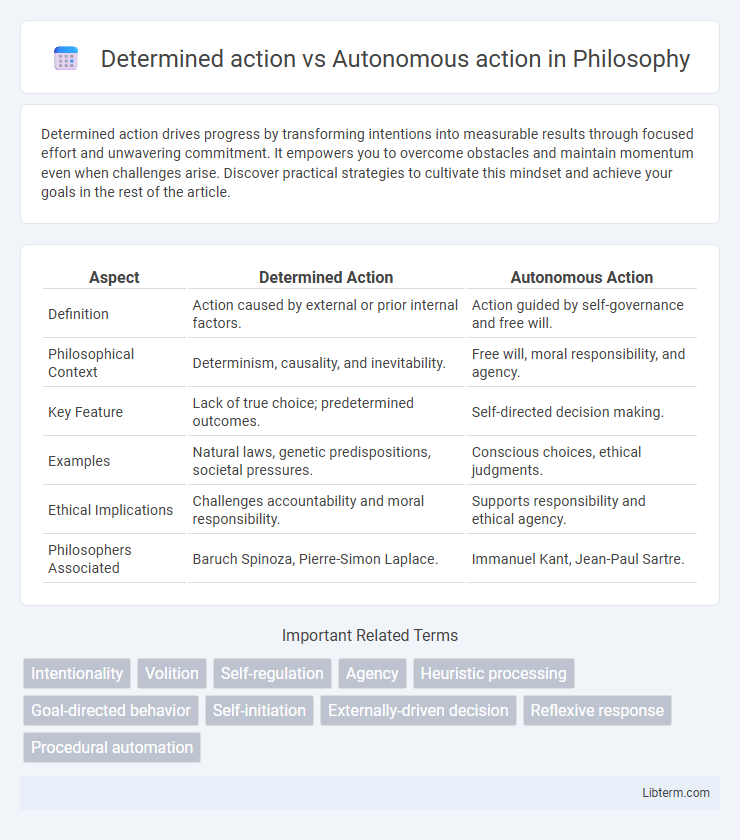Determined action drives progress by transforming intentions into measurable results through focused effort and unwavering commitment. It empowers you to overcome obstacles and maintain momentum even when challenges arise. Discover practical strategies to cultivate this mindset and achieve your goals in the rest of the article.
Table of Comparison
| Aspect | Determined Action | Autonomous Action |
|---|---|---|
| Definition | Action caused by external or prior internal factors. | Action guided by self-governance and free will. |
| Philosophical Context | Determinism, causality, and inevitability. | Free will, moral responsibility, and agency. |
| Key Feature | Lack of true choice; predetermined outcomes. | Self-directed decision making. |
| Examples | Natural laws, genetic predispositions, societal pressures. | Conscious choices, ethical judgments. |
| Ethical Implications | Challenges accountability and moral responsibility. | Supports responsibility and ethical agency. |
| Philosophers Associated | Baruch Spinoza, Pierre-Simon Laplace. | Immanuel Kant, Jean-Paul Sartre. |
Understanding Determined Action: Definition and Characteristics
Determined action refers to behavior driven by specific external stimuli or internal motivations, characterized by predictability and goal-oriented responses. Unlike autonomous action, determined actions are influenced by predefined conditions or rules, ensuring consistency and reliability in outcomes. Understanding determined action involves recognizing its reliance on cause-effect relationships and its adaptation based on environmental feedback.
What Defines Autonomous Action? Key Features Explored
Autonomous action is defined by an agent's ability to make decisions and execute behaviors independently, without external control or instructions. Key features include self-governance, adaptability to changing environments, and goal-directed behavior emerging from internal motivations. This contrasts with determined actions, which are strictly influenced or dictated by external factors or predetermined rules.
Theoretical Foundations: Determinism vs Autonomy
Determinism posits that every event or action is causally determined by preceding events, emphasizing predictability and predetermined outcomes derived from physical laws. Autonomous action, rooted in philosophical autonomy theories, highlights self-governance and intentional agency, where individuals exercise free will independent of external causal chains. The theoretical foundation contrasts deterministic causality with the capacity for self-directed decision-making, reflecting ongoing debates in metaphysics and cognitive science about freedom and constraint in human behavior.
Human Motivation: External Influences vs Internal Drives
Determined action stems from external influences such as social expectations, rewards, or pressures, shaping behavior through motivation tied to outside factors. Autonomous action arises from internal drives like personal values, intrinsic interests, and self-determination, leading to behavior motivated by genuine desire and self-regulation. Understanding the distinction between these motivation sources is crucial for fostering effective goal-setting, enhancing engagement, and promoting sustained behavior change.
Free Will and Moral Responsibility in Action
Determined action arises from causal chains that limit an agent's freedom, challenging traditional notions of free will and moral responsibility by suggesting behavior is predetermined rather than chosen. Autonomous action emphasizes self-governance and rational deliberation, supporting the view that individuals possess free will necessary for moral accountability. The debate centers on whether genuine free will exists in determined contexts, impacting how responsibility is assigned for ethical conduct.
Psychological Perspectives on Determined and Autonomous Behavior
Determined action stems from external stimuli and internal drives shaping behavior patterns through conditioning and unconscious processes, emphasizing the role of determinism in psychological frameworks. Autonomous action involves self-governance, deliberate decision-making, and intrinsic motivation, highlighting cognitive autonomy and the capacity for self-regulation in human behavior. Psychological perspectives contrast determinism with agency, exploring how factors like environment, cognition, and personality interact to influence whether behavior is constrained or self-directed.
Neural Mechanisms: How the Brain Governs Action
Determined actions involve neural circuits primarily in the premotor and motor cortices, where external stimuli trigger predictable responses through well-defined pathways. Autonomous actions engage the basal ganglia and prefrontal cortex, enabling spontaneous, internally generated movements independent of immediate external cues. Neural mechanisms governing these actions reveal distinct patterns of connectivity and neurotransmitter activity, highlighting the brain's dual capacity for reactive and self-initiated behavior.
Social and Cultural Factors Shaping Autonomy
Social norms and cultural values significantly influence the extent to which individuals exhibit determined or autonomous actions, as collective expectations can either constrain or empower personal decision-making. In societies prioritizing communal goals, determined actions often prevail due to strong social obligations, whereas cultures valuing individualism tend to foster autonomous actions by encouraging self-directed choices. The interplay between social conformity and cultural narratives shapes how autonomy is perceived and exercised within various contexts.
Implications for Ethics and Decision-Making
Determined actions arise from external factors and prior causes, challenging notions of moral responsibility by suggesting limited individual control over decisions. Autonomous actions reflect self-governed choices driven by internal deliberation, foundational to ethical accountability and personal agency. Understanding the balance between determined and autonomous actions critically shapes frameworks for ethical decision-making and legal responsibility.
Real-World Examples: Determined vs Autonomous Actions
Determined actions, such as a factory robot performing repetitive welding tasks, follow predefined algorithms and lack flexibility in unexpected situations. Autonomous actions, exemplified by self-driving cars using AI to navigate complex traffic scenarios, adapt dynamically based on sensor data and real-time analysis. Real-world applications highlight how determined systems excel in controlled environments, while autonomous systems provide robustness amid uncertainty.
Determined action Infographic

 libterm.com
libterm.com